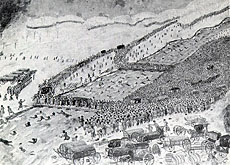Swiss mark signing of landmark act with Napoleon

This week marks the 200th anniversary of a landmark treaty between the Swiss confederation and Napoleon, which ended five years of instability under French rule.
The Act of Mediation, signed on February 19, 1803, returned to the Swiss a greater degree of cantonal rule while ensuring France still had overall power.
The turn of the 18th century was a tumultuous time for Switzerland.
French troops invaded Switzerland in 1798 and within weeks Napoleon promulgated a new constitution intended to replace the patchwork of communities and privileges that had prevailed since the Middle Ages.
But instead of resulting in a brave new Helvetic Republic, Napoleon’s constitution prompted the divided Swiss to come together – liberal and conservative, Catholic and Protestant – in unanimous rejection of his imposed new order.
A series of coup d’états aimed at ending French rule prompted Napoleon to withdraw his troops from the country in 1802.
Civil war immediately broke out and Napoleon stepped in as arbitrator and urged the Swiss to come up with a constitution that was more favourable to them.
The Act of Mediation restored the notion of autonomous cantons and conferred full cantonal status on six areas previously under joint administration: Aargau, Thurgau, Ticino, Vaud, St Gallen and Graubünden.
Compromise
The treaty helped to ease tensions between the two main political groups in Switzerland at the time: the Federalists who favoured a cantonal system of government and the Unitarians, who supported the notion of a centralised state.
The new agreement also suited Napoleon, as he could continue to benefit from the strategic and economic advantages offered by the Confederation, while focusing on resolving conflicts elsewhere in Europe.
But while the act brought ten years of relative peace to Switzerland, its relationship with France became increasingly uneasy.
The French annexation of canton Valais and the occupation of Ticino in 1810 aggravated relations.
The turning point came when the Swiss let Austrian and Russian troops cross the border to reach Basel in December 1813. Nine days later, the Confederation decided to terminate the act.
Dissolved
The end of French rule was formalised during the Vienna Congress of 1815, following Napoleon’s defeat at Waterloo.
In Switzerland – as elsewhere in Europe – the Congress served to restore the old patrician privileges and the Swiss returned to a system of sovereign states.
Changes in its system of governance continued, as did conflicts between the Federalists and Unitarians, until a new Federal Constitution in 1848 brought peace and greater civil liberties.
swissinfo
Napoleon Bonaparte was born in 1769 in Corsica.
The French army invaded Switzerland in 1798.
November 1799: Napoleon seized power of the French Republic.
February 1803: Napoleon and Switzerland signed the Act of Mediation, defining France’s role in the country.
In May 1804: the French Senate proclaimed the French Empire, following successful battles across the European continent.
By 1810, the French empire had almost complete domination of Europe.
In 1814, Napoleon was deposed by the Sénat, following a number of military defeats. Louis XVIII claimed the throne and Napoleon was exiled to the island of Elba.
Later in 1814, Napoleon, in an attempt to reclaim the French throne, was defeated in the Battle of Waterloo.
He was exiled to the island of Saint Helena, where he died in 1821.

In compliance with the JTI standards
More: SWI swissinfo.ch certified by the Journalism Trust Initiative

You can find an overview of ongoing debates with our journalists here. Please join us!
If you want to start a conversation about a topic raised in this article or want to report factual errors, email us at english@swissinfo.ch.